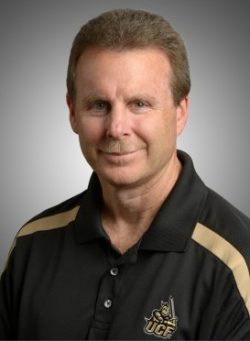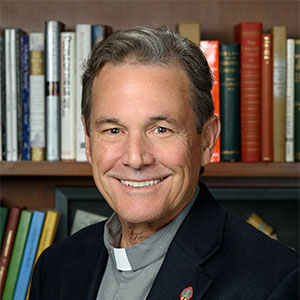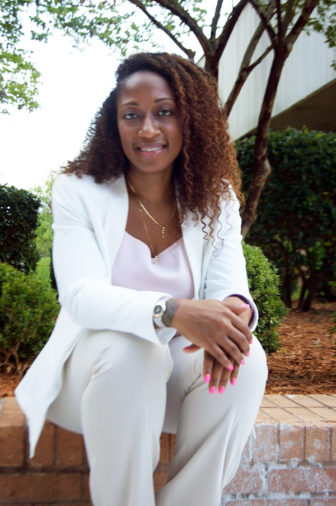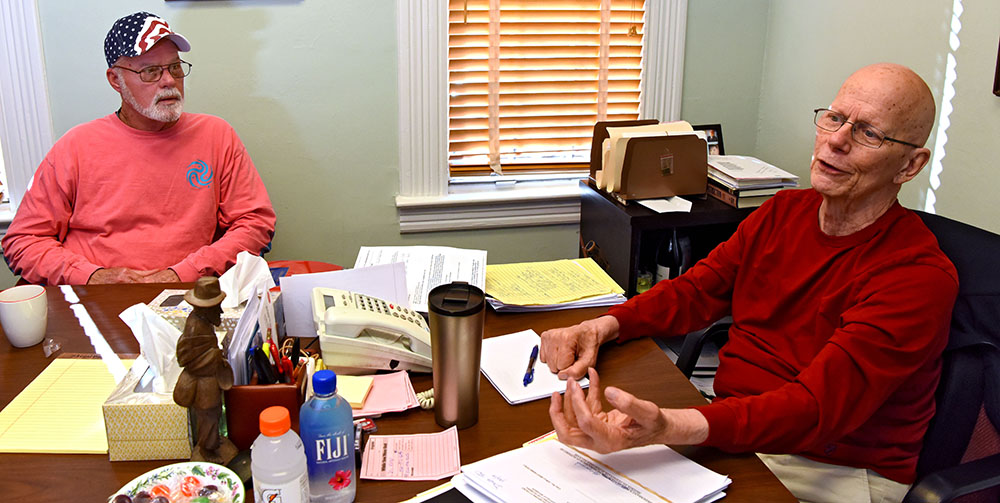JACKSONVILLE, Fla. — Randy Ratledge doesn’t get out much.
Since he was arrested in 2012, Ratledge, 61, has a fear of the police. He doesn’t like leaving his home, and definitely doesn’t like coming downtown, where he was locked up for 117 days.
He faced 120 years in prison, and under the state’s minimum mandatory laws, a judge would have had no choice but to impose that sentence if he’d been convicted.
“I’m getting better,” Ratledge said in a tone of voice that suggests he’s trying to convince himself as much as other people. “I just went and visited my son, his wife and their child. I couldn’t have done that before.”
Ratledge is one of the many people who became caught up in the Florida criminal justice system and faced the possibility of a long, possibly lifelong, prison sentence.
Florida has one of the highest incarceration rates in the nation. And while many still defend the policies that creates those rates, there is a growing consensus that reform is needed.
There are nearly 100,000 people locked up, according to a 2018 study from the Crime and Justice Institute in Boston commissioned by the Florida Senate. Per capita, that means the state’s incarceration rate is 20 percent higher than the national average. And even though the crime rate has dropped in the last generation, the state’s long prison sentences and lack of parole keep a lot of people locked up.
Florida’s incarceration rate of 960 per 100,000 residents is higher than the national average of 890, the Florida Policy Institute found. And that rate has almost doubled since 2005, when the state had 492 inmates per 100,000 residents.
“At some point we decided we were going to get tough on crime,” said Marissa Alexander, a Jacksonville woman who faced a potential 60-year prison sentence for firing a warning shot in the direction of her abusive husband. “But we didn’t get smart on crime.”
How did it happen?
People who have worked in the Florida legal system for decades lament the changes they’ve seen. Almost all those changes have led to more people going to jail and longer prison sentences.
“My sense is that we let the ‘tough on crime’ movement get out of hand, and it influenced legislators, prosecutors and judges to push toward a radical system that valued PR over common sense,” said Sandy D’Alemberte, a former president of the American Bar Association and former president of Florida State University.
Bill White, the Jacksonville public defender from 2005 to 2009 who worked for decades before that under then-Public Defender Lou Frost, said the system has changed to the point where incarceration is the focus even when it doesn’t have to be.
“In 1974 you didn’t get five years if it was your first offense and you were charged with a third degree felony,” White said. “The law allowed for that, but a judge would almost never do the maximum.”
Then the Florida Legislature started mandating minimum mandatory sentences that took discretion out of judges’ hands. Repeat offender statutes also passed, mandating harsher sentences for someone convicted of a second or third crime.
The state essentially did away with parole in the 1990s when it passed legislation requiring every person in prison to serve at least 85 percent of their sentence, Jacksonville attorney Matt Kachergus said.
“The system is now designed to make everyone be incarcerated,” he said. “Other options aren’t considered.”
Miami defense attorney Bob Josefsberg called the law ridiculous.
“People just don’t see things in the long term,” he said. “If we could just get the addicts into a treatment program instead of locking them up it would be such a big deal.”
Bill Sheppard, also a Jacksonville attorney, said prosecutors hold all the power because they decide how long someone is locked up; judges have no discretion under minimum mandatory laws.
“A prosecutor just out of law school has more power than a judge who has been on the bench for 20 years,” he said.
Harry Shorstein, who was state attorney for the 4th Judicial Circuit from 1991 to 2009, said the changes to the way Florida punishes people have been “monumental.”
“The overarching reason is that politicians want to look tough,” he said. “And they think locking a lot of people up makes them look tough.”
And in many places in the state, it’s impossible not to seek maximum sentences because prosecutors feel the pressure to look tough, Shorstein said.
Retired Florida Supreme Court Justice Gerald Kogan agrees: “The politicians want to be re-elected and they don’t want to be seen as soft on crime, because they think that will cost them the next election.”
The prison-industrial complex
Sheppard is one of the most well known lawyers in Florida, having argued cases involving civil rights, gay marriage and prison rights. His longest running lawsuit was Costello v. Wainwright, first filed in the early 1970s, it argued that prisoners at the Duval County jail were having their rights violated because of inadequate medical care, poor staffing, overcrowding and poor sanitation.
It took almost 20 years, but Sheppard won the case. It was the first time a class-action lawsuit like that had been won by the inmate population. He now vows he will never file another one.
“When you win they respond by building a bigger prison,” Sheppard said. “And anytime you build a prison, they’ll find a way to fill it.”
Bruce Jacob, dean emeritus of Stetson University College of Law, remembers that the state had between five and 10 prisons when he was working for the Florida Attorney General’s Office in the late 1950s and early 1960s.
According to the Florida Department of Corrections website, the state now has 143 facilities statewide, including 43 prisons, 33 work camps, 15 annexes, 20 work release centers and six road prisons/forestry camps.
There are an additional seven private prisons in the state, according to the Florida Department of Management Services website.
The prison boom really started in the mid-1980s when drugs like crack cocaine were booming, said Susan MacManus, a distinguished professor emerita at the University of South Florida.

University of Central Florida
Aubrey Jewett
Florida had one of the highest crime rates in the country back in the 1980s, University of Central Florida political science professor Aubrey Jewett said. That led to much harsher sentences.
“It really devastated the minority community,” Jewett said.
You can’t discuss mass incarceration without discussing racism, Sheppard said. Go into any courthouse where defendants are being arraigned and you’ll see that most of them are black.
“The racial disparities in this state are still awful,” he said. “Until you find a way to deal with that, you’re going to keep having these problems.”
For more information on Racial-Ethnic Fairness, go to JJIE Resource Hub | Racial-Ethnic Fairness
JeffriAnne Wilder, a research scientist at the National Center for Women and Technology, said the last few decades have seen the criminalization of people of color, especially young black males, nationwide.
The public school systems in some minority neighborhoods are bad, leading to a school-to-prison pipeline that is still operating today, Wilder said.
And schools that suspend or expel troubled youth have become part of the problem. Because once a child is no longer in the school system, and lacks a high school diploma, a life of crime is one of the few options that exists, Wilder said.
“We need to undo these practices,” she said. “Don’t criminalize bad behavior.”
Former Public Defender White said Florida has been obsessed with locking people up, and ignored better ways, such as drug court, which allows people to get treatment for substance abuse and stay out of the regular criminal justice system.
“Drug courts work; the number of people who reoffend after going through drug court is much lower than people who go through the regular court system,” he said. “But in Jacksonville they were boutique courts with only 100 or so people.”
MacManus said she thinks the prison population is unlikely to keep going up, but she’s not sure there will be a big decrease either, as criminal justice reform advocates hope.
“There are still a lot of old conservative people here,” she said, arguing that those people will likely be suspicious and hostile to many reform proposals.
Prosecutors and police have been slow to support changes.
That became evident after incoming Gov. Ron DeSantis was elected and appointed a Governor's Transition Advisory Committee on Public Safety stacked with sheriffs and state attorneys.
And while their recommendations haven’t been released, an article in the Miami Herald made clear that there would be significant pushback to reform efforts, with many on the advisory committee saying the incarceration rate had kept the state safe.
That type of thinking is wrong, University of North Florida criminology professor Michael Hallett said. Increased incarceration is not the reason why the crime rate has dropped in the last generation, he said.
“Criminal justice stakeholders trying to take credit for this downturn is like an astronomer taking credit for an eclipse,” Hallett said. “The downturn has more to do with age demographics, changes to illicit drug markets and millennials' entirely sensible aversion to crack cocaine.”
Even with the overall crime rate dropping, crime remains high in the places where it was a problem 20 to 30 years ago.
“Deindustrialised urban neighborhoods characterized by high unemployment and blight remain the violence and crime capitals, just like they have always been,” Hallett said.
A holistic criminal justice system
Former Miami Public Defender Bennett Brummer, who served from 1977 to 2009, is not bursting with optimism when it comes to the future of criminal justice in Florida. But he does see reasons for hope.
Amendment 4, which restored voting rights to more than one million felons who had served their time and made restitution, passed with more than 60 percent voting in favor. Voters also approved a bill legalizing medical marijuana a few years ago and voted in new prosecutors in Jacksonville, Orlando and Tampa who promised reform.
There’s also a growing push to issue more civil citations for minor offenses, which would keep people out of the criminal court system.
“We’re going to have fewer people locked up in the state because fewer people are being arrested,” Brummer said. “The trial rate is also very low. We’re seeing a lot more plea deals.”

Episcopal Children's Services
Allison DeFoor
Allison DeFoor, a lifelong Republican who was the Monroe County sheriff and also served as a prosecutor, public defender and law professor, said his experiences have shown him that locking everyone up doesn’t work. And he believes others are coming to the same conclusion.
“We know what works,” DeFoor said. “Education, mental health treatment, substance abuse treatment and strengthening family ties.”
He is now an Episcopal priest who was one of the founders of the Project for Accountable Justice at Florida State University, an organization that advocates for criminal justice reform.
You’re now seeing an emerging consensus in favor of reform that’s creating some strange alliances, DeFoor said, with conservative groups focused on the cost saved by lowering the incarceration rate and liberal groups focused on changing the system because they believe it’s the humane thing to do.
“You have the Koch Brothers working with George Soros on this,” he said. “I don’t think anyone ever thought they’d see that.”
Life after incarceration

Marissa Alexander Justice Project
Marissa Alexander
Jacksonville resident Marissa Alexander was charged with three counts of aggravated assault with a weapon for shooting in the direction of her estranged husband and his two children. Alexander, who had given birth to a child days before, claimed she fired a “warning shot” in the direction of her husband after he’d beaten her, and said the two children were in a different part of the house and were never in danger.
She was convicted of the crime with little to no publicity. But between her conviction and sentence, the case attracted a tremendous amount of attention on social media, with many pointing out the injustice of a woman facing a long prison sentence from charges by a man who admitted he’d beaten her minutes before.
The judge sentenced her to 20 years in prison, but said he personally disagreed with the sentence. Alexander was later set free due to faulty trial instructions and agreed to a plea deal that locked her up for three years.
Alexander said she feels an obligation to help others after so many rallied to support her. She is advocating for reducing the incarcerated population in the state, and is also trying to counsel women freed from prison to help them make the transition.
Randy Ratledge is not there yet. But at some point he hopes to be able to help others.
“I stay at home, I have a lot of trust issues and if I see a police car I get real nervous,” he said.
According to police reports, Ratledge was talking with friends and neighbors outside his home in August 2012 when he went into the house and came back with a gun. He fired a shot in the air, then ran at the people outside screaming profanities while firing a second shot in their direction.
No one was hurt or killed. Sheppard, who represented Ratledge, argued that he was involuntarily intoxicated because he’d taken an Ambien pill and didn’t remember the shooting.
Ratledge was convicted at his first trial of six counts of aggravated assault; there were six people outside when he fired the shots. The conviction was thrown out on a technicality.
A second jury acquitted him of two of the charges and reduced the other four to misdemeanors before convicting him. With the charges dropped to misdemeanors Circuit Judge Jack Schemer was not bound by minimum mandatory laws, and he sentenced Ratledge to the 117 days he’d already been locked up, allowing him to walk out of the courthouse a free man.
“The main thing was my attorney, and God, of course,” Ratledge said.
During his 117 days in jail he didn’t get all the insulin he needed for his diabetes and as a result he may eventually need to have part of his foot amputated.
Ratledge agreed to talk for this story because Sheppard encouraged him to do it. The interview occurred at Sheppard’s office, a few blocks from the Duval County Jail. Ratledge said he felt safe because Sheppard was there, but that he would never do another interview because talking about this is so hard.
“I’d never been involved in the criminal justice system before,” Ratledge said. “I didn’t know what to expect.”
Now when he sees on the news that someone has been arrested, he sees it differently.
“I see the politicians talking about how you fix this issue,” he said. “They’re just spinning their wheels until you address poverty and education and jobs.”
This project was collaboratively produced with Jaxlookout and underwritten in part by The Vital Projects Fund and NewsMatch funders like you.

Pingback: Florida Is One of the Most Overincarcerated Places in U.S. Is It Likely to Change? - Juvenile Justice Information Exchange - C4 FL